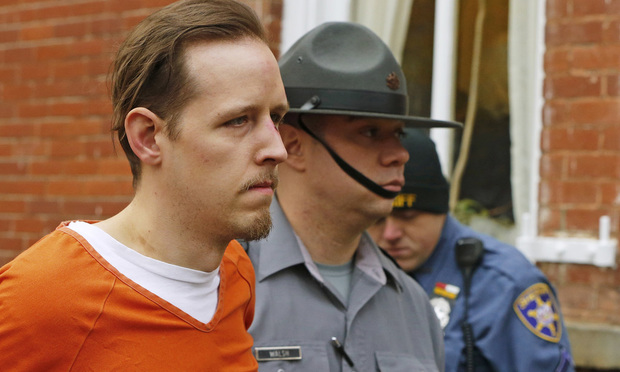Pa. Sniper Tells Justices His Confession Violated Miranda
The case hinges on whether law enforcement violated a man's Miranda rights when they continued to ask questions about the ambush after he said he didn't want to talk.
May 17, 2018 at 03:20 PM
3 minute read
 Eric Frein, left, is escorted out by police after his arraignment Oct. 31, 2014, at the Pike County Courthouse in Milford, Pennsylvania. (AP Photo/Rich Schultz)
Eric Frein, left, is escorted out by police after his arraignment Oct. 31, 2014, at the Pike County Courthouse in Milford, Pennsylvania. (AP Photo/Rich Schultz) The man who ambushed a police barracks in 2014 only wanted to tell investigators where he had buried the rifles involved in the shooting, and never wanted to talk about any of the alleged crimes.
U.S. marshals, however, continued to press the man on the attack that left one officer dead, and eventually Eric Frein confessed. On Thursday, Frein's attorney argued before the Pennsylvania Supreme Court that continuing to question his client about the ambush was a severe violation of Frein's rights under Miranda v. Arizona, which warrants a new trial.
“He told the marshals he didn't want children to find where the rifles were buried, and he said, 'I don't want to talk about any crime,'” Kingston, Pennsylvania, attorney William Ruzzo told the justices. “The officers played him like a violin. They did a good job with the interrogation, except they violated his rights.”
Several justices acknowledged early in the arguments the significance of the issue raise in the capitol appeal, and their lines of questioning focused on whether Frein's statement could be seen as a clear assertion of silence, or if it was ambiguous, since he continued to talk after showing where the rifles were buried.
“Is it one ambiguous statement, or can it be bifurcated into two statements?” Justice Max Baer asked.
Ruzzo contended that Frein clearly indicated he did not want to talk about anything involving the crimes, and could only have waived his Miranda rights if he changed custody to another law enforcement authority and had been re-Mirandized, which did not happen.
“'Scrupulously honored' means 'scrupulously honored,'” Ruzzo said, citing the 1975 case Michigan v. Mosley, which interpreted the implications of Miranda.
Frein ambushed the Blooming Grove state police barracks in September 2014, fatally shooting one officer and severely injuring another. The shooting grabbed national attention as Frein led law enforcement officials on a nearly 50-day manhunt. The 35-year-old was convicted last year of first-degree murder and sentenced to death.
The confession was included at trial, along with numerous other pieces of physical evidence linking Frein to the shooting.
Justice Kevin Dougherty cited that fact when he questioned whether the court should find that any potential Miranda violations were harmless error given the strength of the other evidence.
Although Ruzzo said “a confession can be the most damaging evidence admitted,” Pike County District Attorney Raymond Tonkin contended that, given the numerous other pieces of evidence, the confession shouldn't result in a new trial.
“If you couldn't find harmless error here, I don't know a case where you could find harmless error,” Tonkin said.
The prosecutor focused his arguments on the fact that Frein voluntarily continued to talk after he gave up the location of the weapons, and that he was clearly warned “anything” he said could and would be used against him. Tonkin also contended that Frein's assertion of silence was ambiguous.
However, both Justices Christine Donohue and David Wecht noted that Miranda clearly recognizes defendants can place limits on what topics they are willing to discuss with police.
“Apparently it's not that easy,” Donohue said. “Apparently saying that, in your view, is not an invocation of your right to silence.”
This content has been archived. It is available through our partners, LexisNexis® and Bloomberg Law.
To view this content, please continue to their sites.
Not a Lexis Subscriber?
Subscribe Now
Not a Bloomberg Law Subscriber?
Subscribe Now
NOT FOR REPRINT
© 2025 ALM Global, LLC, All Rights Reserved. Request academic re-use from www.copyright.com. All other uses, submit a request to [email protected]. For more information visit Asset & Logo Licensing.
You Might Like
View All


Stevens & Lee Hires Ex-Middle District of Pennsylvania U.S. Attorney as White-Collar Co-Chair
3 minute read
Judge Tanks Prevailing Pittsburgh Attorneys' $2.45M Fee Request to $250K
5 minute readTrending Stories
- 1AIAs: A Look At the Future of AI-Related Contracts
- 2Litigators of the Week: A $630M Antitrust Settlement for Automotive Software Vendors—$140M More Than Alleged Overcharges
- 3Litigator of the Week Runners-Up and Shout-Outs
- 4Linklaters Hires Four Partners From Patterson Belknap
- 5Law Firms Expand Scope of Immigration Expertise, Amid Blitz of Trump Orders
Who Got The Work
J. Brugh Lower of Gibbons has entered an appearance for industrial equipment supplier Devco Corporation in a pending trademark infringement lawsuit. The suit, accusing the defendant of selling knock-off Graco products, was filed Dec. 18 in New Jersey District Court by Rivkin Radler on behalf of Graco Inc. and Graco Minnesota. The case, assigned to U.S. District Judge Zahid N. Quraishi, is 3:24-cv-11294, Graco Inc. et al v. Devco Corporation.
Who Got The Work
Rebecca Maller-Stein and Kent A. Yalowitz of Arnold & Porter Kaye Scholer have entered their appearances for Hanaco Venture Capital and its executives, Lior Prosor and David Frankel, in a pending securities lawsuit. The action, filed on Dec. 24 in New York Southern District Court by Zell, Aron & Co. on behalf of Goldeneye Advisors, accuses the defendants of negligently and fraudulently managing the plaintiff's $1 million investment. The case, assigned to U.S. District Judge Vernon S. Broderick, is 1:24-cv-09918, Goldeneye Advisors, LLC v. Hanaco Venture Capital, Ltd. et al.
Who Got The Work
Attorneys from A&O Shearman has stepped in as defense counsel for Toronto-Dominion Bank and other defendants in a pending securities class action. The suit, filed Dec. 11 in New York Southern District Court by Bleichmar Fonti & Auld, accuses the defendants of concealing the bank's 'pervasive' deficiencies in regards to its compliance with the Bank Secrecy Act and the quality of its anti-money laundering controls. The case, assigned to U.S. District Judge Arun Subramanian, is 1:24-cv-09445, Gonzalez v. The Toronto-Dominion Bank et al.
Who Got The Work
Crown Castle International, a Pennsylvania company providing shared communications infrastructure, has turned to Luke D. Wolf of Gordon Rees Scully Mansukhani to fend off a pending breach-of-contract lawsuit. The court action, filed Nov. 25 in Michigan Eastern District Court by Hooper Hathaway PC on behalf of The Town Residences LLC, accuses Crown Castle of failing to transfer approximately $30,000 in utility payments from T-Mobile in breach of a roof-top lease and assignment agreement. The case, assigned to U.S. District Judge Susan K. Declercq, is 2:24-cv-13131, The Town Residences LLC v. T-Mobile US, Inc. et al.
Who Got The Work
Wilfred P. Coronato and Daniel M. Schwartz of McCarter & English have stepped in as defense counsel to Electrolux Home Products Inc. in a pending product liability lawsuit. The court action, filed Nov. 26 in New York Eastern District Court by Poulos Lopiccolo PC and Nagel Rice LLP on behalf of David Stern, alleges that the defendant's refrigerators’ drawers and shelving repeatedly break and fall apart within months after purchase. The case, assigned to U.S. District Judge Joan M. Azrack, is 2:24-cv-08204, Stern v. Electrolux Home Products, Inc.
Featured Firms
Law Offices of Gary Martin Hays & Associates, P.C.
(470) 294-1674
Law Offices of Mark E. Salomone
(857) 444-6468
Smith & Hassler
(713) 739-1250





